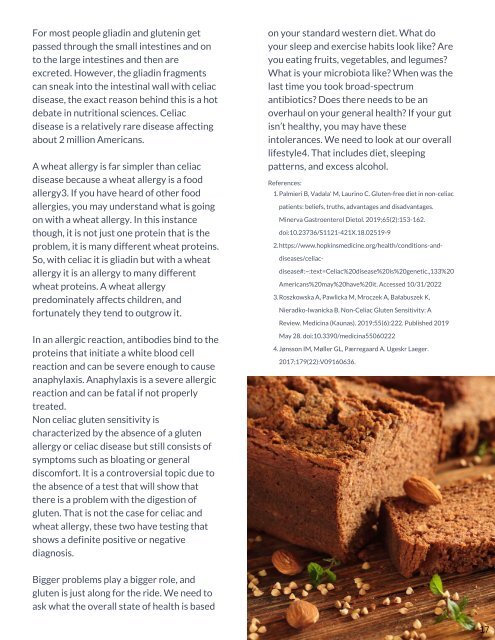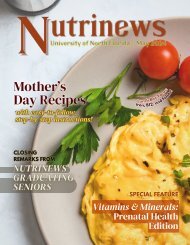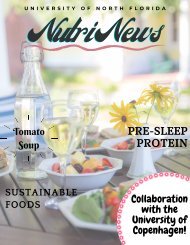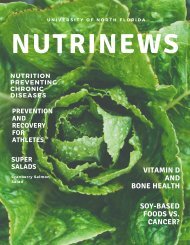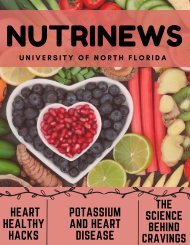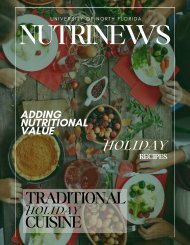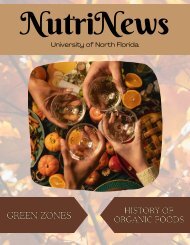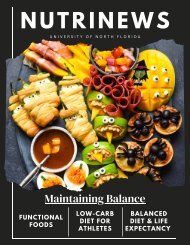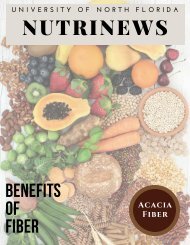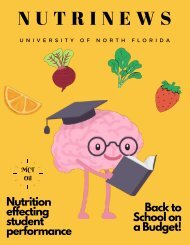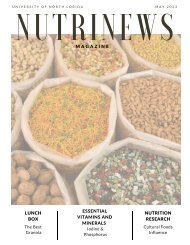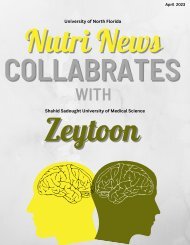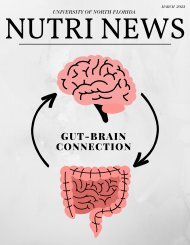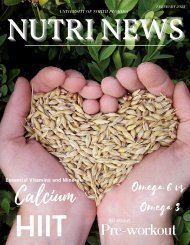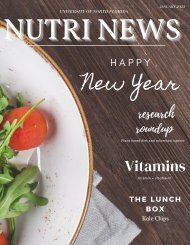Nutri News December 2022
This month theme is the colors of health!! You will find articles about: • The importance of a colorful diet “Eat the Rainbow” • How is biotechnology is affecting our foods • What is intuitive eating and how it can help you recognize and be more sensitive to your body’s hunger and satiety signals • Delicious and colorful vegan recipes in the lunch box! • What’s the hype behind Phytochemicals, are they really that important? Let me answer that for you, YESSS!! • Have you seen those foods that claim to be gluten “free” and have wonder what gluten is and if you should care whether your food is gluten free, check our myth busting article to find out more • The holidays are coming and with that all the delicious foods we like to indulge on, but beware “SALT” check out our international collaboration about salt and salt substitutes • “Ditch the dietary supplements and eat whole foods instead” What are the effects of supplement vs whole foods in sports performance • Have you been feeling tired and down recently? you might have a vitamin D deficiency, check out our essential guide to vitamins and minerals article to learn more about the role of magnesium and vitamin D in our mood, sleep, and overall health This month’s student spotlight is Lindsey Cedeno Ortiz, check what she has to say in page 12! For this month interview, we have Dr. Catherine Christie, recipient of the Academy of Nutrition and Dietetics Medallion Award. This is an interview you won’t want to miss!!!! If you are looking to make an impact on campus as well as in the community, look for the fliers highlighting volunteer opportunities. These amazing programs are always looking for more volunteers. It is amazing the difference we can make when we all work together for a better and healthier tomorrow. Happy reading!
This month theme is the colors of health!!
You will find articles about:
• The importance of a colorful diet “Eat the Rainbow”
• How is biotechnology is affecting our foods
• What is intuitive eating and how it can help you recognize and be more sensitive to your body’s hunger and satiety signals
• Delicious and colorful vegan recipes in the lunch box!
• What’s the hype behind Phytochemicals, are they really that important? Let me answer that for you, YESSS!!
• Have you seen those foods that claim to be gluten “free” and have wonder what gluten is and if you should care whether your food is gluten free, check our myth busting article to find out more
• The holidays are coming and with that all the delicious foods we like to indulge on, but beware “SALT” check out our international collaboration about salt and salt substitutes
• “Ditch the dietary supplements and eat whole foods instead” What are the effects of supplement vs whole foods in sports performance
• Have you been feeling tired and down recently? you might have a vitamin D deficiency, check out our essential guide to vitamins and minerals article to learn more about the role of magnesium and vitamin D in our mood, sleep, and overall health
This month’s student spotlight is Lindsey Cedeno Ortiz, check what she has to say in page 12!
For this month interview, we have Dr. Catherine Christie, recipient of the Academy of Nutrition and Dietetics Medallion Award. This is an interview you won’t want to miss!!!!
If you are looking to make an impact on campus as well as in the community, look for the fliers highlighting volunteer opportunities. These amazing programs are always looking for more volunteers. It is amazing the difference we can make when we all work together for a better and healthier tomorrow.
Happy reading!
You also want an ePaper? Increase the reach of your titles
YUMPU automatically turns print PDFs into web optimized ePapers that Google loves.
For most people gliadin and glutenin get<br />
passed through the small intestines and on<br />
to the large intestines and then are<br />
excreted. However, the gliadin fragments<br />
can sneak into the intestinal wall with celiac<br />
disease, the exact reason behind this is a hot<br />
debate in nutritional sciences. Celiac<br />
disease is a relatively rare disease affecting<br />
about 2 million Americans.<br />
A wheat allergy is far simpler than celiac<br />
disease because a wheat allergy is a food<br />
allergy3. If you have heard of other food<br />
allergies, you may understand what is going<br />
on with a wheat allergy. In this instance<br />
though, it is not just one protein that is the<br />
problem, it is many different wheat proteins.<br />
So, with celiac it is gliadin but with a wheat<br />
allergy it is an allergy to many different<br />
wheat proteins. A wheat allergy<br />
predominately affects children, and<br />
fortunately they tend to outgrow it.<br />
In an allergic reaction, antibodies bind to the<br />
proteins that initiate a white blood cell<br />
reaction and can be severe enough to cause<br />
anaphylaxis. Anaphylaxis is a severe allergic<br />
reaction and can be fatal if not properly<br />
treated.<br />
Non celiac gluten sensitivity is<br />
characterized by the absence of a gluten<br />
allergy or celiac disease but still consists of<br />
symptoms such as bloating or general<br />
discomfort. It is a controversial topic due to<br />
the absence of a test that will show that<br />
there is a problem with the digestion of<br />
gluten. That is not the case for celiac and<br />
wheat allergy, these two have testing that<br />
shows a definite positive or negative<br />
diagnosis.<br />
on your standard western diet. What do<br />
your sleep and exercise habits look like? Are<br />
you eating fruits, vegetables, and legumes?<br />
What is your microbiota like? When was the<br />
last time you took broad-spectrum<br />
antibiotics? Does there needs to be an<br />
overhaul on your general health? If your gut<br />
isn’t healthy, you may have these<br />
intolerances. We need to look at our overall<br />
lifestyle4. That includes diet, sleeping<br />
patterns, and excess alcohol.<br />
References:<br />
1. Palmieri B, Vadala' M, Laurino C. Gluten-free diet in non-celiac<br />
patients: beliefs, truths, advantages and disadvantages.<br />
Minerva Gastroenterol Dietol. 2019;65(2):153-162.<br />
doi:10.23736/S1121-421X.18.02519-9<br />
2. https://www.hopkinsmedicine.org/health/conditions-and-<br />
diseases/celiac-<br />
disease#:~:text=Celiac%20disease%20is%20genetic.,133%20<br />
Americans%20may%20have%20it. Accessed 10/31/<strong>2022</strong><br />
3. Roszkowska A, Pawlicka M, Mroczek A, Bałabuszek K,<br />
Nieradko-Iwanicka B. Non-Celiac Gluten Sensitivity: A<br />
Review. Medicina (Kaunas). 2019;55(6):222. Published 2019<br />
May 28. doi:10.3390/medicina55060222<br />
4. Jønsson IM, Møller GL, Pærregaard A. Ugeskr Laeger.<br />
2017;179(22):V09160636.<br />
Bigger problems play a bigger role, and<br />
gluten is just along for the ride. We need to<br />
ask what the overall state of health is based<br />
17


